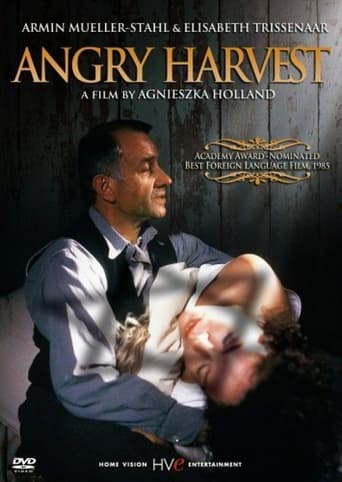gavin6942
In the winter of 1942-43, a Jewish family leaps from a train going through Silesia. They are separated in the woods, and Leon, a local peasant who's now a farmer of some wealth, discovers the woman, Rosa, and hides her in his cellar.What makes this film memorable is how it approaches the World War II era differently from many other films. We have a Jewish family, but there is not really a focus on the Holocaust or even really on the Nazis. We know they are in the background, but not the focus.There is much that could be discussed about the primary relationship -- is it natural, is it forced? Is there maybe even a bit of Stockholm Syndrome going on there? Is the man a hero, a villain, both... or neither? Does he know what he does is wrong?
RNQ
Some reflections on how badly this film has been served, stemming from my surprise I had never heard of it, when I was looking for the work of Agnieszka Holland. The DVD from CCC Filmkunst, 1984, bears only the English title "Angry Harvest," and no indication that it should be originally "Bittere Ernte," a Harvest not "angry," but "grievous," "spoilt" too like the apples dumped out so that sack can be used for a darker purpose. Or I suppose one could think of Julia Ward Howe's Divinity "trampling out the vintage where the grapes of wrath are stored," but it never has come to that. The perpetrators of great wrong sit comfortable. We know that the Holocaust cannot be represented in art forms. With the perpetrators too we would destroy the screen. That's why it's odd that Roger Ebert, listed among Critics of this film and usually so generous in his sympathy, should have condemned the movie for not showing enough devastation. The film does something else with Arendt's insight into "the banality of evil." After Sunday mass occupying German soldiers chat with local girls. Property can be acquired in a way that is "perfectly legal" once one knows it was expropriated from a Jew "who probably won't be back to claim it." And thus to Leo Wolny, who is such a nice man and will bring you potatoes if you are out and soothe your fever. This is something different from what the box calls "a compelling story of love and desire." It is about a man and his peers who are "bitterböse," "fiercely evil."
Michael Neumann
The ambiguous morals of a poor farmer in occupied Poland lead to despair after he shelters an attractive Jewish refugee in his cellar during World War II. The initial act of kindness quickly degenerates into a masochistic tug-of-war: the farmer's infatuation soon gives way to sexual obsession, and the captive runaway is forced to accept his twisted affection to avoid being exposed. The script is strong, the performances are excellent (in particular Armin Müller-Stahl as the repressed Catholic peasant); but the total effect is curiously uneven, as if a powerful drama, handled with perhaps too much detachment, got lost somewhere in translation.
Tom Murray
A lonely German farmer (Armin Mueller-Stahl) hides a lovely, upper-class, Jewish lady from the Nazis. He falls in love with her and avoids helping her to escape; he would rather keep her with him. He hides the signal, that the lady's husband had left to show that he is still alive; the farmer would prefer that the husband be dead. This fascinating and subtle character study, by director Agnieszka Holland, depicts a man, torn between his conscience and his love, in a situation that he is unable to cope with adequately. Mueller-Stahl's performance is superb and very touching.


